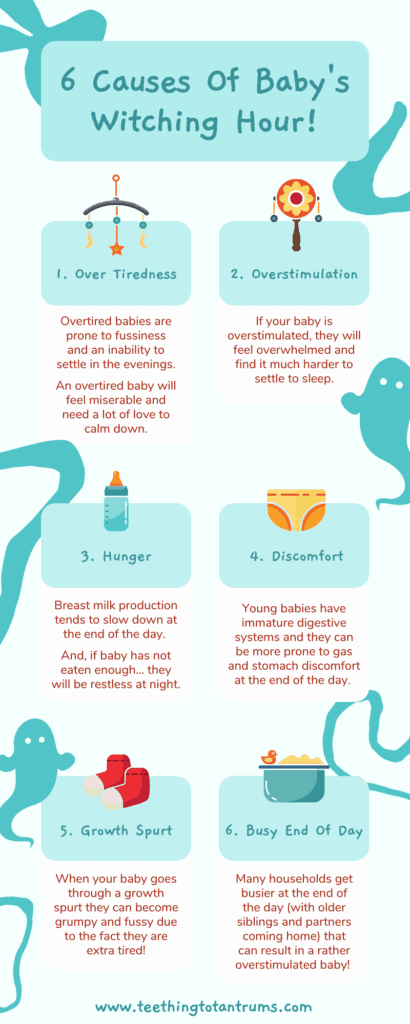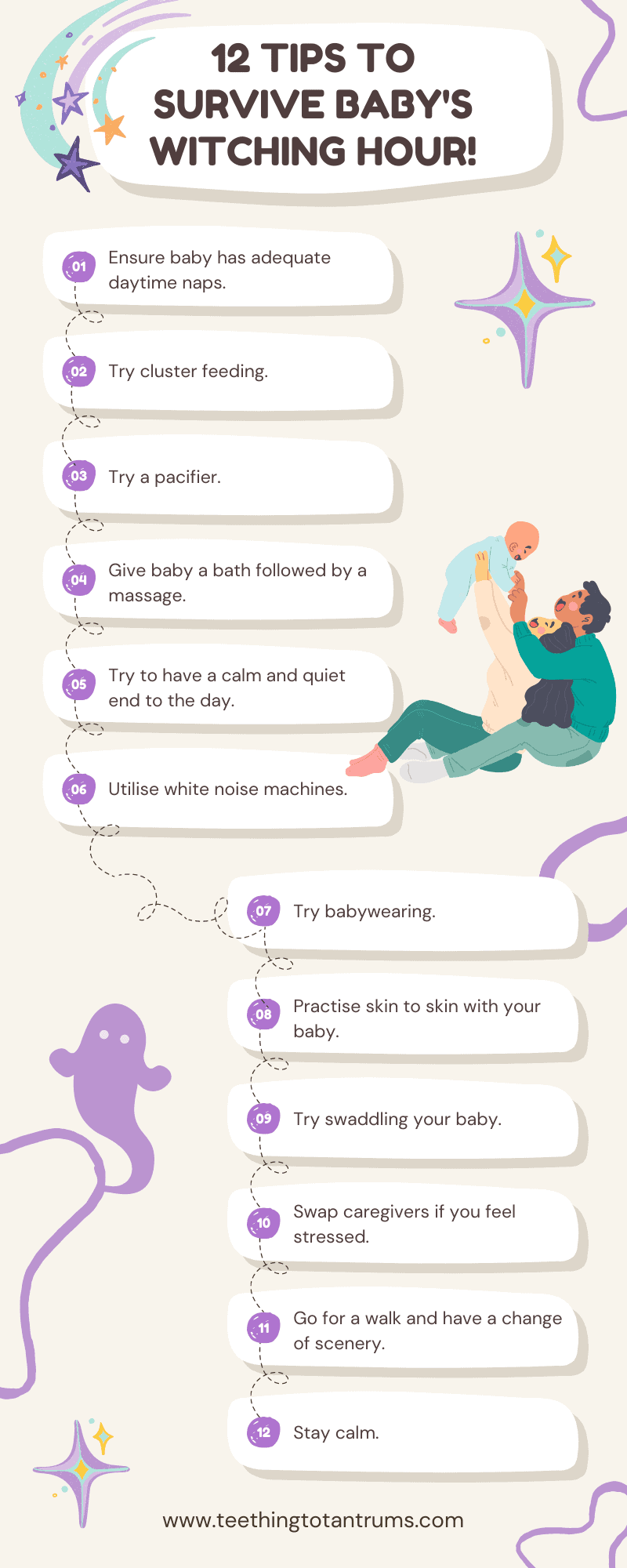Do you ever find yourself enjoying a peaceful day with your baby, only to have them suddenly start crying, fussing, and grizzling in the evening? If so, your baby may be experiencing the mysterious phenomenon known as baby’s witching hour.
But fear not, as we delve into what causes this phenomenon and explore ways to help your baby avoid it. As an exhausted parent, you deserve to understand the witching hour and find ways to put your baby to sleep so that you can finally get some much-needed rest. So, keep reading to discover the secrets of baby’s witching hour and how to overcome it.

Table of Contents
What Is Baby’s Witching Hour?
Baby’s witching hour is determined as a period of time in the evening hours when your normally happy and content baby starts to get grizzly and difficult to settle… Typically wailing and crying for hours for no apparent reason. Some newborn babies will be inconsolable during this time too.
When Does The Witching Hour Happen?
The witching hour can occur any time from 3 weeks of age, usually peaking at around 6 weeks and fading by 2-3 months of age.
But during this time, baby’s witching hour can happen any day between 5pm and 11pm. It can last for a couple of hours and can escalate from grizzling and fussing to full-blown screaming.
This is a long time to have to deal with the excessive crying of a fussy baby at the end of a long and tiring day, especially when you are hoping to have some peace and downtime to recharge those parenting batteries… So what causes the witching hour and how can we try and avoid it?
6 Causes Of Baby’s Witching Hour
There are several things that can cause a baby witching hour episode. Here are the top 6:

- Overtiredness. Overtired babies are prone to fussiness and an inability to settle as their bodies are full of stress hormones (adrenaline and cortisol). And if your baby has not had enough daytime sleep then by the end of the day, they will be absolutely exhausted. I know it sounds counterintuitive, but an overtired baby will not fall asleep easily. They will feel miserable and will require some persuasion to settle.
- Overstimulation. Along with tiredness, overstimulation can also impact hugely on your baby’s ability to settle. If your baby is suffering from overstimulation they will feel overwhelmed and their little brains will just not be able to cope so they will find it much harder to settle.
- Hunger. Breastfed babies are more likely to suffer from being hungry at the end of the day due to the fact that breast milk supply has a tendency to slow down in production and volume at the end of the day. This can cause your baby to be restless at night and trigger a witching hour episode.
- Discomfort. Young babies have immature digestive systems and they can be more prone to gas and stomach discomfort at the end of the day. This does not necessarily have to be colic or reflux… But rather just a bad case of wind.
- Growth Spurt. When your baby goes through a growth spurt they can become grumpier and fussier than usual due to the fact they are using extra energy to grow and can easily become overtired.
- Busy End Of Day Routine. Many households get busier at the end of the day with older siblings and partners coming home, which can result in overstimulation. You will also be busier at the end of the day by dealing with the needs of your family and, as a result, your baby will not be happy about not having your undivided attention at a time of day when they need it most (trigger a witching hour). Young babies ideally need to wind down and have a quiet end to their day in order for them to settle nicely.
Looking to get your little one to sleep quickly and effortlessly? Check out my Bedtime and Nap Cheat Sheet and master the art of making daytime naps and bedtimes as seamless as possible.
A bedtime & nap cheat sheet so good your little one will ask you to put them to bed...
Laura Williams "This is a life saver! I'm so glad I downloaded your bedtime & nap cheat sheet. My little one actually asked me to put him to bed last night! Unbelievable! Thank you so much!"
Click Here For The FREE Cheat Sheet
12 Tips To Survive Baby’s Witching Hour
If your little one is suffering from the witching hour, there are some things you can try to ease the impact of this unsettling phenomenon.
Some may work, some may not… But whatever happens, just go with the flow.
The good news is that as with many baby issues, baby’s witching hour is a passing phase.

1. Ensure Baby Has Adequate Daytime Naps
Take a look at your baby’s daily routine and sleep schedule to see if they are getting enough daytime sleep.
Adequate naps are an important part of your new baby’s routine and trying to ensure your baby reaches the end of the day having had enough sleep, will go a long way to avoiding overtiredness.
2. Try Cluster Feeding
To ensure that your baby is getting enough to eat at the end of the day, try cluster feeding. This can really help and make up for the fact that you might not be producing as much milk at the end of the day.
3. Try A Pacifier
Sometimes the good old-fashioned pacifier can help soothe your baby during the witching hour.
In conjunction with cluster feeding, sucking on a pacifier can be very comforting for your baby during a fussy period.
These cute dishwasher-safe orthodontic pacifiers have a teat that is designed to allow for a natural sucking motion, reducing pressure on the jaw and teeth, and preventing teeth misalignment! Their heart-shaped shield also fits perfectly under baby’s nose for easy breathing making them the perfect pacifier for your baby!
NOTE: There are so many different styles of pacifiers, so you may need to test a few shapes to find one that your baby is happy with. I suggest starting with an orthodontic pacifier and going from there.
4. Have A Bath And Give Baby A Massage
Some young babies don’t like baths just yet, but many newborns will find a warm bath or a ‘top and tailing’ session calming and distracting (especially if it is followed by a baby massage).
The essence of this tip is to get cosy and warm, touch and bond with each other and relax to decrease the likelihood of baby experiencing a witching hour.
5. Try To Have A Calm And Quiet End To The Day
Try and establish a peaceful and consistent evening routine for your baby. Move them to a quiet space such as a dimly lit room where you can feed them in peace, wind them and rock them before settling them to sleep.
TOP TIP: I know this can be hard if you have a toddler to entertain too, but try your very best to have a calm baby routine and remember to give your toddler lots of love and attention during their bedtime routine so they feel even more special.
6. Utilise White Noise
White noise machines are a great way to calm babies at the end of the day and avoid the witching hour as they cut down on distracting household and background noises, making it easier for them to settle.
For the first few weeks, your baby will have been able to sleep almost anywhere no matter how noisy…
But as they grow they become more aware and normal household noises may start to prevent them from settling.
A white noise machine is a perfect way to eliminate these distractions. I love this one from DreamEgg:
White noise machines are a game-changer for your little one's sleep and having one that plays all night is a must. With a long-lasting battery, this compact and stylish white noise machine contains 21 non-stop relaxing noises, which will lull your little one to sleep night after night, no matter where you are!
7. Wear Your Baby
Babywearing during the newborn witching hour may also help as it gives them that close contact with you and they may fall asleep there quite happily.
Wearing your baby in a baby carrier is especially useful if you have other children to look after at the end of the day so both arms are free but baby can still feel close to you.
8. Practise Skin To Skin
Some babies find skin-to-skin contact very calming… so it is worth giving it a try when burping them to see if it helps with a grizzly whining baby.
9. Swaddle Baby
Swaddling is another great way to calm your baby if they are fretting. Swaddling makes them feel safe and, coupled with you rocking them, a swaddle can often help them settle and reduce any possibility of a witching hour.
Swaddling your baby at night will also help to prevent the Moro Reflex from waking baby up too.
With soft, plush micro-fleece, this super soft swaddle wraps newborns in just the right amount of warmth. This sleep sack swaddle suits infants from birth to potentially 3 months, offering both comfort and safe sleep practices with its arm immobilization feature.
The innovative 3-way swaddling system adapts to a baby's sleep style, a crucial feature for those restless nights. Whether it's arms in, hands-to-face, or arms out, it grows with the baby's swaddling needs!
Meanwhile, the bottom zipper makes midnight diaper changes a breeze!
10. Swap Caregiver
A witching hour is a challenging time. And at the end of a long day looking after your baby, it can be difficult to stay calm when your little one gets fussy and difficult to calm.
So, try handing your baby over to your partner who will probably have a lot more patience and feel a lot calmer, to deal with the witching hour blues.
11. Have A Change Of Scenery
If you can, taking time outside in the late afternoon can help calm your baby during baby’s witching hour. Take them out and about into the fresh air or pop them in the pram and go for a walk.
The fading light may help their circadian rhythm realign as their bodies produce melatonin and prepare to sleep. And fresh air is always good for you and baby.
12. Hang In There And Stay Calm
Finally, you might just have to hang in there and stay calm.
The witching hour is a difficult and trying time for you and your baby, but keep faith in the fact that it is just a passing phase and should be over by the time your baby is 2-3 months old.
Frequently Asked Questions About Baby’s Witching Hour
Looking for more information about baby’s witching hour? Find the answer to the most commonly asked questions here.
When Do I Need To Contact A Doctor About Baby’s Witching Hour?
I would say to follow the 3-3-3-rule.
If your baby is crying for 3 hours or more, 3 evenings a week, for more than 3 weeks and is accompanied by your baby drawing up their legs towards their tummy, arching their back and spitting up then you should consult a doctor to rule out colic or reflux.
When Do Babies Grow Out Of The Witching Hour?
Most babies will have grown out of their witching hour phase by 4 months old. And it will be a welcome relief for you both!
But if you’re little one is still struggling to settle at night beyond 4 months, you may need to visit a medical professional to rule out anything more serious.
How Parents Can Help Themselves Through The Witching Hour
Being a new parent is hard. Dealing with a grizzly baby is hard.
So remember to be kind to yourself during this time and try to squeeze extra ‘you-time’ into the day.
- Look into organising your shopping to be delivered to your home so you can savour a bit of time at home without worrying about buying supplies.
- When baby is having a nap, try to sleep yourself, watch an episode of your favourite tv show or have a cup of something warm cosy-ing up on the sofa. Trust me, it will work wonders to make you feel like you.
- Find a TV show or book that you can enjoy anytime, anywhere. Streaming apps and audiobooks are ideal when you need a little escape, but need your hands to do other things.
- Don’t be afraid to ask for help. If baby is struggling to settle night after night and you’ve been looking after them all day, don’t feel bad for asking for help, support or a night off. You can’t pour from an empty cup.
Is Colic The Same As Baby’s Witching Hour?
Some say that colicky babies and the witching hour are one and the same thing… This is WRONG. Whilst colic can contribute, colic is a completely separate condition that requires definitive treatment and needs to be diagnosed by a paediatrician.
Do All Babies Go Through Witching Hour?
No. Not all babies will go through a witching hour phase. Remember the witching hour is more consistent that the occasional evening of having a fussy baby.
Is PURPLE Crying The Same As Baby’s Witching Hour?
PURPLE crying and baby’s witching hour can be used interchangeably if you wish.
Purple crying stands for:
- Peak of crying. Baby is wailing a lot. The most crying may happen in baby’s second month, with less crying in months three to five.
- Unexpected. There’s no rhyme or reason as to why baby starts and stops crying.
- Resists soothing. Rocking, singing, bouncing, swaying – you may not be able to do anything, to help soothe baby and ease the sobbing.
- Pain-like face. Baby may appear to be in pain when crying, even when they’re not.
- Long-lasting. The crying can seem never-ending. In fact, baby may cry for five hours a day or more.
- Evening. The late afternoon and evening may be when baby cries the most.
Which follows a similar trend to baby’s witching hour.
Do Formula-Fed Babies Have Witching Hours Too?
Yes, formula-fed babies can also experience a witching hour. The baby witching hour is not specific to breastfed babies – it often comes down to your baby’s personality and how they settling.
Need More Parenting Help?
- Download our FREE Bedtime & Nap Sleep Cheat Sheet. It’s a free, easy-to-use and proven formula designed for parents of 0-5 year olds to master the art of consistently undisturbed and restful sleep without the yelling, nagging or exhausting long-winded evenings.
- Check out our Parenting Toolbox. You’ll get access to expertly-chosen products that you can guarantee are the best for your little one and your wallet.
- Are you looking for personalized guidance to navigate the challenges of parenting? I offer 1-on-1 consultations to bring you tailored strategies and actionable advice to help support your child's growth and well-being with confidence.

A bedtime & nap cheat sheet so good your little one will ask you to put them to bed...
Laura Williams "This is a life saver! I'm so glad I downloaded your bedtime & nap cheat sheet. My little one actually asked me to put him to bed last night! Unbelievable! Thank you so much!"
Click Here For The FREE Cheat Sheet





